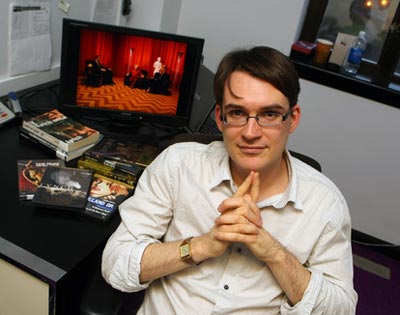 |
| Prof. David Nicol is teaching a new course on director David Lynch. (Nick Pearce Photo) |
Professor David Nicol plans to delve into that question with his new theatre/film studies course , which will be offered for the first time next semester. Prof. Nicol, who teaches theatre classes on both film and dramatic literature, claims a longstanding fascination with David Lynch.
‚ÄúI was exposed to Dune. You know Dune? I apologize. I feel bad for you. I was brought to see Dune when I was 10 by my friend‚Äôs dad for my friend‚Äôs birthday‚Ķ which is outrageous, because it‚Äôs a 15-certificate movie.‚ÄĚ (Fifteen-certificate is roughly analogous to the North American PG-13; Prof. Nicol is British). ‚ÄúI remember very little from it,‚ÄĚ he adds, ‚Äúexcept that it may have made me the person I am today.‚ÄĚ
His next exposure was Lynch‚Äôs The Elephant Man, a relatively straightforward John Merrick biopic. Then in 1990, Professor Nicol ‚Äď and much of the rest of western civilization -- tuned in for Lynch‚Äôs televised mystery soap opera, Twin Peaks. ‚ÄúMy parents kind of dropped out after the first three or four episodes. I kept watching it up in my room.‚ÄĚ
Many people reacted to Lynch‚Äôs works in the manner of the elder Nicols‚ÄĒfilm critic Roger Ebert famously detested Blue Velvet. But with insulating quantities of time and space between humanity in general and shock masterpieces like Eraserhead and Lost Highway, some feel it‚Äôs finally safe to start evaluating Lynch‚Äôs work in a new light.
‚ÄúPeople were starting to look back on it (Blue Velvet) and started to see it as a modern classic,‚ÄĚ says Prof. Nicol. As for his own interest in the director, ‚ÄúI keep sort of coming back to David Lynch, because he‚Äôs very useful‚Ķ in terms of teaching film.‚ÄĚ The slow, deliberate pacing of the films makes them good raw material for basic analysis, as does their use of light and their repeated reuse of the same symbols and even the same actors.
But how do you even start teaching a course on someone known, essentially, for well-paced, carefully shot insanity? ‚ÄúPsychoanalytic theory is going to be pretty necessary,‚ÄĚ he says. ‚ÄúA lot of people taking (the class) are going to be massive Lynch geeks, which is going to be helpful‚Ķ essentially we‚Äôre going to learn a lot about David Lynch‚Äôs inspirations.‚ÄĚ
 |
| Filmmaker David Lynch. |
These inspirations are incongruously tame ‚Äď films like Sunset Boulevard, for instance, which Lynch apparently has his cast and crew screen before every shoot. The class will also examine Lynch‚Äôs most common motifs ‚Äď things like red curtains, which may be found in Mulholland Drive, Twin Peaks, Lost Highway, and possibly Eraserhead (‚ÄúThey may be red. It‚Äôs hard to tell. It‚Äôs black and white.‚ÄĚ) Prof. Nicol sees Lynch as an ‚Äėauteur‚Äô, a single artist-director exploring a consistent set of themes over the course of his movies‚ÄĒwhether those movies are enjoyable or not isn‚Äôt really the point. ‚ÄúYou can‚Äôt genuinely claim that Dune is a good movie‚Ķ (but) here I am, sitting here, 25 years later, and I‚Äôm still disturbed by (∂Ŕ≥‹≤‘Īū‚Äôs) sand worms. And that‚Äôs why I‚Äôm saying that Dune is such a wonderful movie in some respects.‚ÄĚ
Since this is H¬ĢĽ≠‚Äôs first course on a single director, ‚Äúthis is a new direction for us,‚ÄĚ says Prof. Nicol. And while courses on Lynch have been taught at other universities, he ‚Äúdeliberately didn‚Äôt look. It‚Äôs a very Lynch-y attitude. I didn‚Äôt want to be second-guessed. I feel like it‚Äôs like an interesting experiment. Anything could happen. It‚Äôll be like making Eraserhead, in a way.‚ÄĚ
Those interested in taking part in an experimental academic Eraserhead (a very frightening prospect in many respects) should act soon because space is limited. All self-respecting geeks (myself included) will want to know what really killed Laura Palmer.
Dal News writer Rebecca Schneidereit is a fourth-year English and Theatre student. She has also written for Fathom, The Gazette and Disney’s Propaganda Games.
